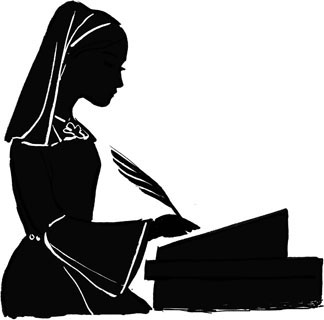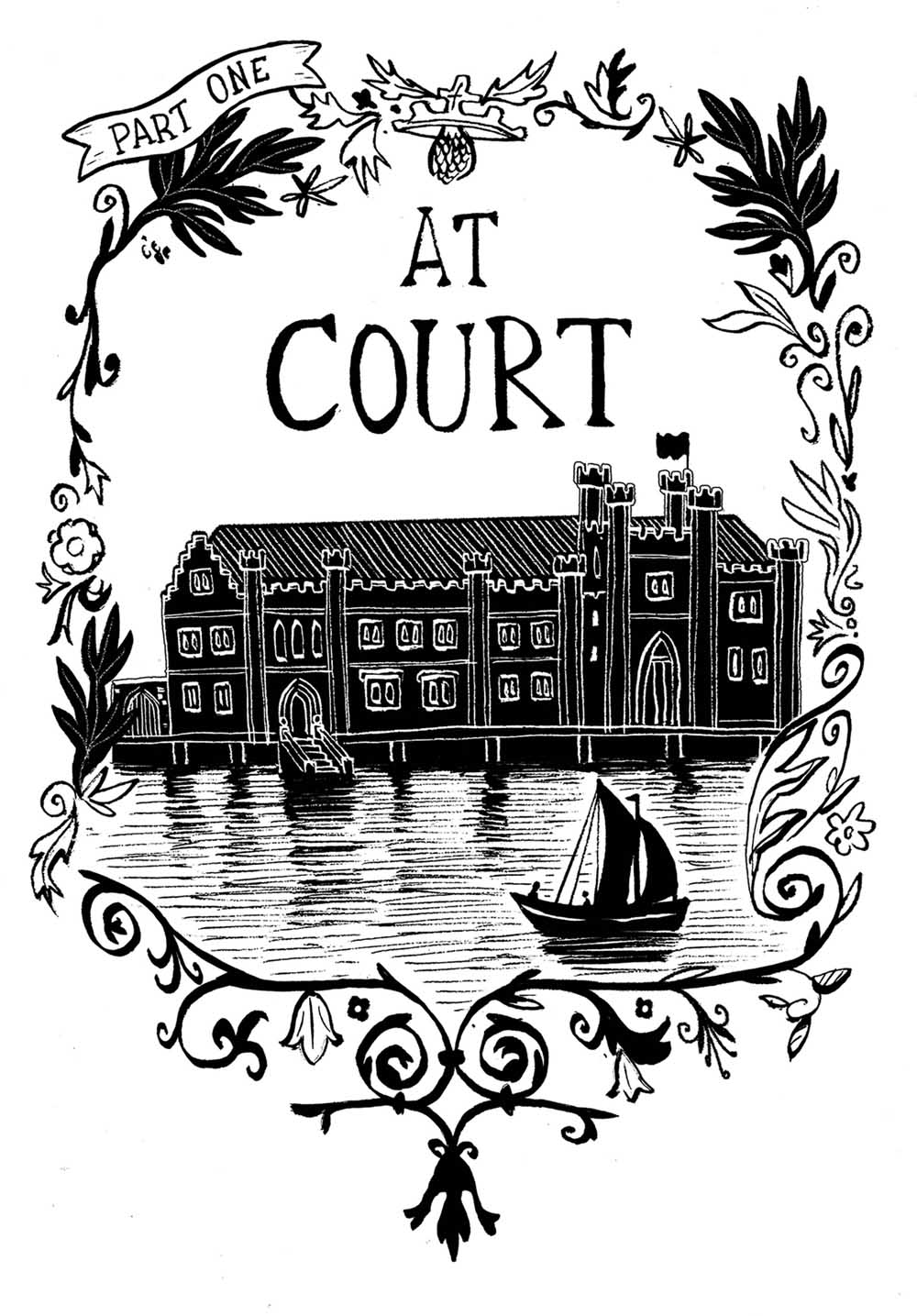

in the Queen’s Bedchamber, Mary is nine …
‘Press a little harder with the pen, Mary. Your letters are all faint.’
‘Like a spider’s footsteps.’
Mary had spoken without thinking, but the image was striking, and it made her mother laugh. The tiny feet of a spider, trailing across the paper. Yes, Mary’s handwriting was difficult to read, unlike the bold, strong strokes of her mother’s draft that she was copying.
‘Mary! You are daydreaming again, aren’t you?’
‘Yes, Mother. Daydreaming. As always.’
‘No need to be pert!’
Mary returned her attention to the task, but the spider wouldn’t leave her mind. She imagined him stopping a moment for a sit-down, crossing his many legs. It made her giggle. Laboriously, she tried to copy out the next few words.
… my heart and soul will always be yours …
Her mother was hovering anxiously, and Mary wished she would go away. Mary did not mind writing, even enjoyed it sometimes, but she hated to be watched. Yet she had to do this for Charles, the emperor, her beloved. Yes, he was her beloved. She had been told it so many times that she almost believed it. Mary stroked her gold brooch, its letters spelling out his name: THE EMPEROUR.
Mary’s mother noticed what she was doing.
‘Ah yes!’ she said, delighted. ‘You are thinking of your husband-to-be. I see it! Thoughts of love and honour fill your head, angelito mio. What a magnificent future you have ahead of you – an empress! Nothing could be better, nothing more splendid. Your Spanish grandmother would be proud.’
Mary was so used to her mother’s rhapsodies about her imperial future that she barely listened. But while her ears might not have been working, her eyes certainly were.
‘What’s that, Mother?’
Mary noticed that Queen Catherine was holding something in her own fingers, turning it over and over, as if it were precious. She looked up from her examination of the tiny, glinting object, a triumphant smile on her face.
‘Can you see what it is?’
Mary peered. It was a ring, clearly. But what kind?
Mary racked her brains for the colours of the precious stones that she had learned with Mr Featherstone. What colour was it? She examined it, turning it to the light.
‘It’s green, isn’t it? Is it … an emerald?’
‘Yes!’ Her mother was rapturous, in a way that always slightly embarrassed Mary. It was easy to learn her lessons from Mr Featherstone. It was harder to know what to say in any given situation. She wished, often, for less fuss and to be left alone with her thoughts. Mary rolled her eyes. Green and gold, green and gold; they were her mother’s favourite colours.
‘It’s a huge emerald, isn’t it?’ her mother continued. ‘As green as poison. And in a magnificent setting of gold as well. This will be your gift to your amado, Mary. We will send it with your letter.’
Mary slightly lost interest in the ring, if it was to pass so quickly through her possession. ‘Oh Mary,’ her mother sighed. ‘You are not like other girls. You aren’t interested in jewels, are you? Don’t you want to keep it for yourself?’
‘Not really,’ Mary admitted. ‘I would rather have a sister. Or, if I can’t have a sister, then a kitten.’ Mary knew that she shouldn’t ask for a sister, or a baby brother. It made her mother upset. ‘Yes, I’d rather have a kitten,’ she said definitively.
Her ruse worked. ‘Oh no, not kittens again!’ The queen was exasperated. ‘They have fleas, querida. And there is no place for them in the train of an army.’
‘But Mother!’ This time Mary’s attention was captured to the extent that she threw down her pen. ‘I am not in the train of an army. I will never be in the train of an army. I am stuck here in this royal palace, with nothing much to do, and nobody to play with, and loads of people gawping at me whenever I set foot out of our chamber.’
Catherine at once looked very grim, and crouched down by Mary’s chair, looking sternly into her daughter’s face.
‘You,’ she said savagely, holding Mary’s eyes and jabbing at Mary’s chest with her finger, ‘are a daughter of Spain. You will not always be kept safe inside this luxurious palace, as you are now. You will look back on this as a time of great good fortune. The Wheel of Fortune can take you down as well as up, you know.’
‘But Mother,’ Mary said drily. She tired of this debate. She crossed her arms, sulky again. ‘My father is the king of England. Who could know better than him? And he says that women don’t go to war.’ It really was too exhausting to have this argument over and over again.
Catherine continued exactly as if Mary had not spoken. ‘The time will come for bravery,’ she said, tapping a finger on the table. ‘You are a daughter of Spain,’ she said. ‘Your grandmother Isabella was a warrior queen. Even when with child she rode to war! And daughters of Spain are always ready to fight! To fight to the death!’
Mary sighed. ‘But I don’t want to fight to the death,’ she said under her breath. ‘We’re not in the country of the blood-drinkers now.’
She had heard her father refer to Spain in this manner. Although she did not know if Spaniards really did drink blood – what, out of goblets? – she thought it sounded impressively dismissive. But her mother wasn’t listening.
‘When you are married to Charles …’
Catherine was clicking her fingers to regain Mary’s attention. It worked. Mary turned to find her mother’s blue eyes blazing at her, a sharp crease between her eyebrows.
‘When you are married to Charles, when you have come of age in a few years’ time, you will be an empress. You will have many enemies. People will try to take your power away from you. You must always, always be ready to fight to the death. I give you a great gift in telling you this.’
Mary’s attention wandered again, as it so often did. She tried to imagine being married to Charles. She had of course met him, four years ago, when their marriage contract had been drawn up. But it would still be another four years until she would go to Brussels and live with him. It was hard to remember his face. It was hard to imagine being an empress, and being ready to fight to the death every single day.
‘I’d rather be queen of England than an empress,’ Mary said, with decision. ‘Can’t Charles come and live with me here?’ What a lovely thought this was! ‘He could live here, with me, and you, and Father!’ Mary spun round to her mother, stretching out her arms in enthusiasm, the letter forgotten, enraptured with her new idea.
Catherine’s fierce look dissipated in an instant, as it often did when something amused her. But then a shadow crossed her face. She turned back to Mary, revealing her profile like a hawk’s, her heavy eyelids that came down half over her pupils, making her look ancient, timeless.
‘Girls like you, Princess Mary,’ Mary’s mother said, ‘must always go to live abroad. Like I did, you know that! And you should be pleased to leave this miserable land of England, where they don’t care for girls anyway. Just look at the way your father insists that he still has no children. No children! Despite having you, a wondrous Spanish beauty. Although you have red-gold hair – that’s not so Spanish. But of course you get that from me.’
Mary lowered her chin to her chest. Red-gold hair, indeed. It was more like a sort of warm light brown. And despite her mother’s pride in the colour of Mary’s hair, she personally thought it was the same shade as her father’s. It was kind of her mother to call her a beauty, but Mary was suspicious of such terms. She had often examined her nose in the curve of the silver water jug. It flared, rather like the nose of a mule. She would turn her head from side to side, trying to make it look smaller, and indeed, at a certain point the swell of the vessel would make it disappear. All bad things could disappear, she thought, if you looked at them in the right light. But what was it that her mother was going on about now? The letter, oh, the letter. Yes, she must finish the letter to Charles.
The half-empty page looked enormous. Mary’s writing had so far only filled a tiny bit at the top. She should have started lower down, so as to make it look like a long letter with less work. She picked up her pen.
Will anything even come of it? Mary asked herself as she dipped it into the ink. Charles never wrote back. Mary sometimes suspected that her mother went on about things too much, and that this had the effect of boring people and turning them away. Too many letters; too many words.
She tried to imagine Charles reading the letter, trying on the ring. But what came to mind was a frowning man tossing the letter aside, as her father so often did. Secretaries picked up his discarded correspondence afterwards, from the floor, and took it away to deal with it, while he instead strode out saying that he was going hunting.
‘Perhaps,’ she said tentatively, ‘I write too often to Charles. Perhaps it bores him to receive all these letters.’
‘Mary! It is your duty to write often to your amado.’
It wasn’t easy to suggest that her mother might ever be wrong.
Mary sighed. She had known, really, that she would not get off so easily. ‘He needs to be reminded,’ Catherine said, as if to herself, ‘of his ties to Spain. Of his ties to me, his aunt, stuck here in this damp island and married to a piece of soft curds of cheese. He needs reminding,’ she said, her voice rising, ‘of his own duty, which is to marry my daughter.’
‘Soft curds?’ In her mother’s ravings, these were the only words that Mary picked out. ‘My father is not soft like cheese, you know!’
‘Ah, you are indignant, my spitting cat!’ Catherine said, with a laugh. ‘That’s the spirit. I never knew such a girl for daydreaming, nor one who more admired her father. You worship him too much. You should save your worship for God!’
‘Honour thy father and mother,’ Mary said primly. ‘Isn’t that true?’
Catherine knelt again, looking closely into Mary’s face. For a moment Mary feared that she’d get told off for answering back.
But not this time.
‘It is true,’ Catherine said gently. ‘But especially honour your mother, and honour God. That is the Spanish way. There are many spies and liars in the world, but you must always, always trust me. Now, to work. Finish writing out that letter and then we can play.’
I would prefer to make up my own letter rather than copy yours, Mary thought to herself rebelliously as she pulled the draft closer to see it better. And my father is not soft like cheese at all. He says that girls can’t be king. And because he’s the king, and knows everything in the world, he can’t be wrong.
